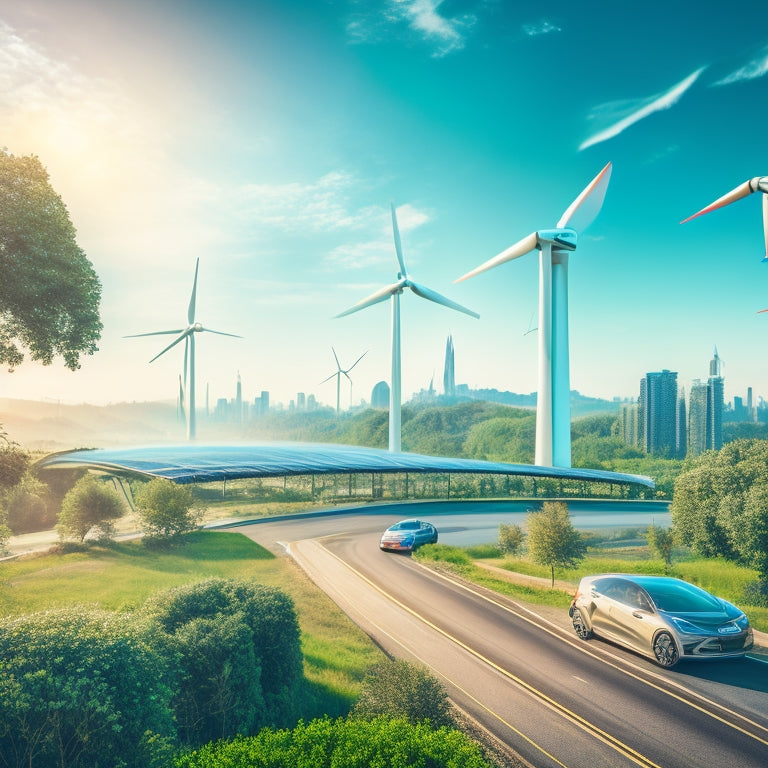
Electric Vehicles Sparking Sustainable Revolution
Share
Electric vehicles are spearheading a sustainable revolution in the transportation sector, driven by rapid advancements in battery technology, innovative manufacturing processes, and a concerted shift towards renewable energy sources. As the world shifts to a more environmentally conscious era, the electrification of the automotive industry is playing a pivotal role. Investments in sustainable infrastructure, smart grid technologies, and renewable energy sources are equally vital in optimizing energy distribution and charging ecosystems. As the industry continues to evolve, one thing is clear: electric vehicles are redefining the future of transportation, and the possibilities are endless.
Key Takeaways
• Electric vehicles are driving a sustainable revolution, shifting the automotive industry towards a greener future with reduced environmental impact.
• Advanced battery technology and renewable energy sources like solar and wind power are crucial for widespread EV adoption.
• Development of sustainable infrastructure, including efficient charging systems and smart grids, is necessary to support the growing EV market.
• Innovative manufacturing processes, such as composite engineering, are optimizing EV production and reducing vehicle weight for enhanced efficiency.
• Collaboration between governments, automakers, and energy providers is essential for creating a resilient EV ecosystem that prioritizes environmentally responsible practices.
Powering the Electric Revolution
As the world shifts towards a sustainable transportation ecosystem, the electrification of the automotive industry is driving a revolution in powering transportation. Advancements in battery technology, energy infrastructure, and innovative manufacturing processes play a pivotal role in shaping the future of electric vehicles.
Renewable energy sources, such as solar and wind power, are essential for sustainably powering electric vehicles. The integration of smart grid technologies enables efficient energy distribution and optimized EV charging. This synergy between renewable energy and smart grid infrastructure is vital for widespread electric vehicle adoption.
Building Sustainable Infrastructure
Over 80% of electric vehicle owners charge their vehicles at home, underscoring the need for sustainable and efficient charging infrastructure that can support widespread EV adoption.
As the demand for electric vehicles continues to grow, building sustainable infrastructure is vital to facilitate seamless EV integration. This necessitates investments in infrastructure development, focusing on sustainable charging solutions that can accommodate the increasing number of EVs on the road.
Governments, automakers, and energy providers must collaborate to create a resilient EV charging ecosystem, incorporating renewable energy sources and smart grid technologies. By prioritizing sustainable infrastructure development, we can guarantee a smooth shift to electric vehicles, reducing our reliance on fossil fuels and mitigating climate change.
Electrifying the Industry
How can the automotive industry's shift to electric vehicles be accelerated and optimized, ensuring a sustainable and efficient move away from fossil fuels?
The key lies in electrifying the industry through innovative manufacturing processes, advanced battery technology, and sustainable materials. Composite engineering plays an essential role in reducing vehicle weight and enhancing energy efficiency.
Additionally, investments in renewable energy sources and smart grid technologies are pivotal for powering electric vehicles sustainably. By revolutionizing transportation through electric vehicles, the industry can achieve sustainable mobility and greatly reduce greenhouse gas emissions.
Collaboration between automakers, policymakers, and technology companies is indispensable for driving innovation and creating a resilient EV ecosystem.
Driving Towards a Greener Future
Electrifying the industry is only the first step, and now, with innovative manufacturing processes and advanced battery technology in place, the focus shifts to driving towards a greener future, where electric vehicles become the norm, and sustainable transportation solutions are integrated into daily life.
As the world moves towards electric vehicles, the environmental impact of transportation will greatly decrease. Innovative technologies, such as solid-state batteries and advanced composites, are driving this shift. By adopting electric vehicles, we can reduce greenhouse gas emissions, improve air quality, and create a more sustainable future.
As the industry continues to evolve, it's essential to prioritize environmentally responsible practices, ensuring a cleaner, healthier environment for generations to come.
Frequently Asked Questions
Can Electric Vehicles Be Charged Using Renewable Energy Sources?
Yes, electric vehicles can be charged using renewable energy sources, leveraging the Renewable Grid and Energy Harvesting technologies to power sustainable transportation, reducing dependence on fossil fuels and mitigating climate change.
How Does Battery Recycling Impact the Environment?
Battery recycling greatly reduces environmental harm by minimizing battery toxicity and promoting closed-loop systems, where recycled materials are reused, thereby decreasing the demand for virgin materials and mitigating the ecological footprint of electric vehicle production.
Are Composite Materials Used in EVS Recyclable?
Crafting conscious composites, material science pioneers prioritize recyclability, ensuring supply chain sustainability and minimizing environmental impact, as researchers develop innovative methods to reuse and recycle composite materials in electric vehicles.
Can Electric Vehicles Be Used as Energy Storage Devices?
Electric vehicles can be utilized as energy storage devices through Vehicle-to-Grid (V2G) technology, enabling them to supply electricity back to the grid, while Smart Charging systems optimize energy distribution and reduce strain on the grid.
Do Electric Vehicles Require Special Maintenance Procedures?
Electric vehicles require regular maintenance, including checking tire pressure to optimize range and efficiency, and replacing brake pads to guarantee safe braking performance, similar to traditional internal combustion engine vehicles.
Related Posts
-

3 Ways Wind Power Boosts Home Value
Living near a wind farm can enhance your property's value in three significant ways. To begin with, proximity to wind...
-

Why Grow Up? Vertical Gardens Transform Urban Living
As you change your urban living space, you're not just growing up - you're bringing nature back into the heart of the...
-

10 Grid-Tied Wind Power Systems for Modern Homes
You're looking for a grid-tied wind power system to utilize wind energy for your modern home. Here are ten options to...


